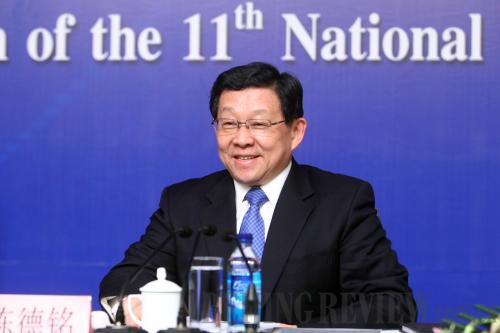|
 |
|
Chen Deming, Minister of Commerce (XING GUANGLI) |
During a press conference at the Fourth Session of the 11th National People's Congress on March 7, Minister of Commerce Chen Deming answered questions on issues related to China's foreign trade, overseas investment and its future opening up. Edited excerpts of Chen's answers follow:
Trade prospects
The principle for this year's foreign trade policy is to stabilize exports, boost imports and reduce trade surplus. The country's exports will face uncertainties due to complicated international and domestic situations, including exchange rate fluctuations, protectionism, rising prices of raw materials, higher labor costs and a shortage of laborers, as well as production cost hikes pushed by higher standards for energy efficiency and environmental protection. As for imports, we expect import growth to be relatively fast as the country steps up efforts to restructure the economy, push forward its free trade agreements and improve import regulations.
Imports will expand rapidly this year as the country steps up efforts to restructure the economy, push forward the establishment of free trade areas and facilitate import procedures.
This year imports growth may outpace exports growth. The proportion of trade surplus to GDP will continue to drop and the trade surplus will decrease further.
Boosting imports
We will continue to expand imports in hi-tech, major equipment manufacturing and environmental protection industries. We will also increase imports of resources we need.
China will not significantly raise imports of staple agricultural commodities including grain and cotton. The country usually reins in agricultural commodities imports through quotas. This is to not only protect domestic production but also to evade sharp price fluctuations on the international market caused by large purchases from China. We are obliged to avoid this.
China is expected to increase consumer product imports in line with Chinese consumer demands. Consumers have the final say in deciding what should be imported. We are trying to communicate with Western economies to alleviate controls on exports to China.
Although the country's trade surplus has been declining, we are aware of the fact that the United States still accounted for 99 percent of the $180-billion trade surplus in 2010, which shows the urgency for us to discuss the trade imbalance with the United States. In the past two years, we have taken effective measures to expand imports from the United States. We have shown our sincerity in improving the trade imbalance between China and the United States.
We hope the United States will response positively to our sincerity and abolish restrictions on exports to China, allowing more U.S. enterprises to have the opportunity to export to China. It will help reduce the unemployment rate in the United States, accelerate the U.S. economic recovery and balance the bilateral trade.
Premier Wen Jiabao has mentioned China will boost imports from least developed countries and countries running trade surpluses. China will realize zero-tariff treatment to 95 percent of products from least developed countries in three years.
Last year, we cut the tariffs on imports from least developed countries by 47 percent. In the next two years, the tariffs for 95 percent of the 7,000 categories imported from least developed countries will be cut to zero.
Security line for M&As
China has established a security review system regarding domestic enterprises' mergers and acquisitions (M&As). Some foreign-funded enterprises are afraid China's opening-up policy will change. But this is not going to happen. The establishment of the review system shows our efforts to enhance national economic security for China's continued opening up. Higher transparency and operability will be ensured in the system. It has been used in many countries around the world before.
Rare earth policy
As the world's largest rare earth exporter, China accommodates more than 90 percent of the world's rare earth demand, though its reserves account for only one third of the world's total. Since China's rare earth resources are in less developed areas and China is inexperienced in mining and processing rare earth, the rare earth industry can be a problem for the environment.
Because we don't have safer, more effective ways to extract rare earth and the only way is soaking the earth in acidic solution, the land has become barren and cannot support forests or other vegetation. In this sense, rare earth mining has had a negative impact on the environment.
| 